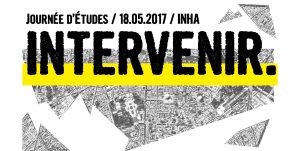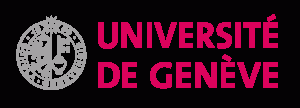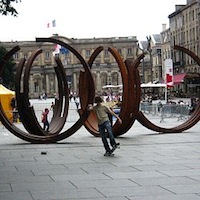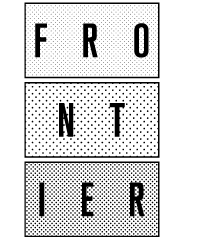Posté par Association 19-20, le 12 avril 2017;

Jeudi 18 mai 2017 de 9h30 à 18h
INHA, salle Demargne
2 rue Vivienne
75002 Paris
Entrée libre
Des nouvelles théories urbaines du début du XIXe siècle aux smart cities contemporaines, en passant par la reconstruction et les mégastructures des années 1950-60 ou les entreprises de rénovation, des années 1970 et 1990, l’espace public des villes européennes a été le lieu d’interventions, d’unions et de confrontations avec l’art et l’architecture.
Trente ans après le colloque « L’art et la ville : urbanisme et art contemporain » qui s’est tenu au Palais du Luxembourg en janvier 1986, il est intéressant d’esquisser un nouvel . . . → En lire plus
Posté par Ana Canti, le 29 mars 2017;
- Date et lieu du colloque : Du 8 au 10 novembre 2017
Museu Nacional de Belas Artes, Rio de Janeiro, Brésil
- Date limite : 15 mai 2017
How is art displayed within collections of different types: scientific, artistic, didactic, museological, private and public? Once we give access to it through this strategy of display, how is it understood? What kind of experience and/or knowledge does it promote? And how does that influence affect the writing of Art Histories? The physical spaces filled by these collections gather different experiences that need to be contemplated [taken into account] in the writing processes of Art Histories. Rather than evaluating works of art through the isolated images of each piece, their photographic representations and the data available in inventories, we propose that trying to access them in physical locations opens up new perspectives. Objects gain concreteness, materiality, positions, means of interaction with other pieces next to them as well as with people who relate to them under these circumstances, which enables us to take into consideration embodied acting observers. In certain locations, empty spaces acquire densities, as intervals between objects working as amalgamations of sense, contributing to give cohesion to the collections. We call for proposals that, within this mental framework, reflect about the spatiality of art collections, considering works of art as they occupy real physical spaces, instigating discussions about art and its location and the means of reception and understanding according to their means of display. . . . → En lire plus
Posté par Allison Huetz, le 22 mars 2016;
- Date et lieu du colloque : 19-20 janvier 2017, Genève, Université de Genève
 Dans le champ des études visuelles, d’importants travaux publiés ou traduits récemment portent sur l’agentivité des images : quel est leur pouvoir, que font-elles, que veulent-elles, peut-on parler d’acte d’image ? Parallèlement, les concepts de performance et de performativité sont de plus en plus employés dans les sciences sociales, et en particulier, interrogés par la géographie. Dans le champ des études visuelles, d’importants travaux publiés ou traduits récemment portent sur l’agentivité des images : quel est leur pouvoir, que font-elles, que veulent-elles, peut-on parler d’acte d’image ? Parallèlement, les concepts de performance et de performativité sont de plus en plus employés dans les sciences sociales, et en particulier, interrogés par la géographie.
Au croisement de ces agendas scientifiques, le colloque proposé par le département de géographie de l’Université de Genève porte sur ce que font les images dans l’espace public. Portraits et statues, monuments figuratifs, affiches publicitaires et politiques, écrans géants sur les places, projections lumineuses sur les façades, murales, street art et installations artistiques, expositions photographiques dans les jardins publics, cartes accolées au mobilier urbain, . . . → En lire plus
Posté par Denis Dubois, le 5 juin 2015;
- Date limite : 10 juillet 2015
- Date et lieu du colloque : 23-24 octobre 2015, Santo Tirso (Portugal), Fabrica Santo Thyrso
 Although the concept of “Public Art” is traditionally associated with a monumental, celebratory or even a figurative expression, for the past few decades – following the dynamics that shaped the second half of the 20th century –, this term has represented an exercise in constant redefinition. Although the concept of “Public Art” is traditionally associated with a monumental, celebratory or even a figurative expression, for the past few decades – following the dynamics that shaped the second half of the 20th century –, this term has represented an exercise in constant redefinition.
In fact, within a context of consecutive unfoldings – and closely considering the known expansion of the sculpture field (Krauss, 1979) –, Public Art has been addressed through many and different operating strategies which, rather than following an abstract notion of space, favour concepts such as “site” or “place” (Yi-Fu Tuan, 1977/ Norberg-Schulz, 1980 / . . . → En lire plus
Posté par Christian Omodeo, le 24 janvier 2013;
- Date et lieu du colloque : 8-9 février 2013, Bologne, 8-9 février 2013, Bologne, 8-9 février 2013, Bologne, 8-9 février 2013, Bologne
 Second stage of the project Frontier is dedicated to Writing and Street Art: an international symposium – open to the public – to analyze together with scholars, experts and artists both disciplines internationally recognized as forms of expression among the most interesting in the world of contemporary art. Second stage of the project Frontier is dedicated to Writing and Street Art: an international symposium – open to the public – to analyze together with scholars, experts and artists both disciplines internationally recognized as forms of expression among the most interesting in the world of contemporary art.
After the completion of the thirteen large facades in the course of 2012, the Frontier project has come to the second step, which is essential for reflection and scientific analysis of the two disciplines.
On 8 and 9 February 2013, at the conference hall of MAMbo – Museum of Modern Art in Bologna, will be held konFRONTIERt. Writing, Street Art and Public Space: hypotheses, research and comparisons, an important opportunity for study and . . . → En lire plus
|
Équipe Rédacteur en chef : Olivier Bonfait.
Rédacteurs : Elliot Adam (Moyen Age) ; Nicolas Ballet (XX-XXIe siècles) ; Matthieu Fantoni (musées) ; Antonella Fenech Kroke (bourses) ; Vladimir Nestorov (Lettre mensuelle)
Administrateur web : Matthieu Lett.
ancien éditeur : Pascale Dubus
anciens rédacteurs : Gautier Anceau, Sébastien Bontemps, Damien Bril ; Sébastien Chauffour ; Ludovic Jouvet ; Aude Prigot
|




